|
The Greatest Tearjerkers of All-Time
|
|
Title Screen
|
Movie Title/Year and Brief Tearjerker Scene Description |
Screenshots
|
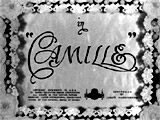
|
Camille (1936)
- the doomed romance in 19th century
Paris between French nobleman Armand Duval (Robert Taylor) and ill courtesan
Marguerite Gautier (Greta Garbo), and his impassioned speech to her as she
died in the inevitable death scene in this timeless classic: ("Think
of how happy we were once, how happy we shall be again. Think of the day
you found the four leaf clover, and all the good luck it's going to bring
us")
- his reaction to her passing while lying in his arms
("Marguerite.
Marguerite! No, don't leave me. Marguerite, come back!"), as he
buried his face on her breast, weeping
- the final fade-out, close-up shot of Marguerite's
lovely, radiant face - imperishable in death
|


|
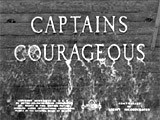
|
Captains
Courageous (1937)
- in the climactic race back
to Gloucester port against a rival schooner, the Jennie Cushman,
Portuguese fisherman Manuel Fidello (Spencer Tracy) volunteered
to climb to the top of the mast to furl the sail, but was tragically
and mortally injured when the mast cracked and he plunged into the
water, caught in the tangled rope and the topsail canvas. Just before
he was cut loose of the ropes to sink below the surface to his death,
he delivered a memorable, sentimental, and tearful goodbye to young
Harvey Cheyne (Freddie Bartholomew): ("Now
listen to me, leetle feesh. I go now...We had good times together,
eh, leetle feesh? We laugh. We sing. So you smile...Manuel - he
be watching you. You be best fisherman ever lived...")
- the
final segment was the poignant memorial service scene with Harvey's
father (Melvyn Douglas) comforting his son in the final shot - silently,
arm in arm, the two watched wreaths float away together in the outgoing
tide
|



|

|
 Casablanca (1942)
Casablanca (1942)
 #35
#35
- cafe proprietor Rick Blaine's (Humphrey
Bogart) demand of piano player Sam (Dooley Wilson) to play "As
Time Goes By":
("You played it for her, you can play it for me...If she can
stand it, I can. Play it!") and the subsequent
flashback to pre-occupation Paris and Rick's romance with former lover
Ilsa (Ingrid Bergman), and the ink of Ilsa's farewell note being washed
away in the rain when she didn't show up at the train station
-
the scene between the two past lovers in Rick's apartment when she
held a gun on him to get the letters of transit - but then broke down: ("If
you knew how much I loved you, how much I still love you!") -
with the two of them falling into each other's arms and kissing passionately
- the touching goodbye scene between trench-coated
Rick and Ilsa on the rainy, foggy airstrip runway in Casablanca,
with Rick's self-sacrifice in urging Ilsa to leave on the plane with
Resistance leader-husband Victor Laszlo (Paul Heinreid): ("Ilsa, I'm no good at being noble,
but it doesn't take much to see that the problems of three little people
don't amount to a hill of beans in this crazy world. Someday you'll understand
that. Now, now. Here's lookin' at you, kid")
- Rick's famous last
line to police chief Renault (Claude Rains): ("Louis, I think
this is the beginning of a beautiful friendship")
|





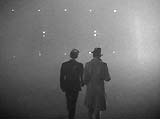
|
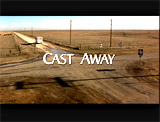
|
Cast Away (2000)
- the scene in which globe-trotting
but stranded castaway FedEx delivery man Chuck Noland (Tom Hanks)
lost his
"best friend" Wilson (a deflated volleyball with
a painted face - his bloody hand-print) when it fell off his raft
and drifted away while he was attempting to escape the deserted island
- he sobbed at the loss ("I'm sorry Wilson, I'm sorry")
- the subsequent
scene of his discovery-rescue, when a gigantic cargo-freighter roared
into view behind his raft
- Chuck's difficult and bittersweet reunion scene
with his ex-fiancee Kelly Frears (Helen Hunt), who had been married
and bore a child in his absence. They hugged and kissed
in the rain and restated their love for each other: (Kelly:
"I always knew you were alive. I knew it. But everybody said
I had to stop saying that -- that I had to let you go. I love you.
You're the love of my life." Chuck: "I love you too, Kelly.
More than you'll ever know" - and then he realized that they
had to let go of each other: "You have to go home")
- Chuck's long monologue about his failed suicide
attempt on the island, his reaction to being back in civilization,
and his loss of Kelly: ("We both had done the math, and -- Kelly
added it all up. She knew she had to let me go. I added it up, knew
that I'd, I'd lost her. 'Cause I was never gonna get off that island.
I was gonna die there, totally alone. I mean, I was gonna get sick
or I was gonna get injured or something. The only choice I had, the
only thing I could control was when and how and where that
was gonna happen. So, I made a rope. And I went up to the summit
to hang myself. But I had to test it, you know? Of course. You know
me. And the weight of the log snapped the limb of the tree. So l-l--
I couldn't even kill myself the way I wanted to. I had power over
nothing. And that's when this feeling came over me like a warm blanket.
I knew, somehow, that I had to stay alive. Somehow. I had to keep
breathing, even though there was no reason to hope. And all my logic
said that I would never see this place again. So that's what I did.
I stayed alive. I kept breathing. And one day that logic was proven
all wrong, because the tide came in, gave me a sail. And now, here
I am. I'm back, in Memphis, talking to you. I have ice in my glass.
And I've lost her all over again. I'm so sad that I don't have Kelly.
But I'm so grateful that she was with me on that island. And I know
what I have to do now. I gotta keep breathing. Because tomorrow,
the sun will rise. Who knows what the tide could bring?")
- Chuck's attempt to deliver the one FedEx
package (with angel wings drawn on it) that he didn't open on the
island. He brought it to the address of the sender, Bettina Peterson
- at a back-country farm-house in Canadian, Texas - the residence
of an artist who specialized in giant sculptures of wings. He wrote
a note to leave with the package when she wasn't home: ("This
package saved my life. Thank you. Chuck Noland")
- in the final scene at a rural crossroads (literally
and figuratively) where Chuck parked his FedEx truck and began looking
at a map, a friendly, unidentified, flirtatious, red-headed local woman
(Lari White) pulled up in a red truck and assisted with directions,
since he appeared lost: ("Well, that's 83 South. And this road here will
hook you up with l-40 East. Uhm, if you turn right, that'll take you
to Amarillo, Flagstaff, California. And if you head back that direction,
you'll find a whole lotta nothin' all the way to Canada...Good luck,
cowboy") - the film concluded with Chuck's enigmatic smile at the crossroads,
after he noticed angel wings painted on the back of the woman's truck
and realized she was the package's sender
|







|
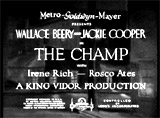
|
The Champ (1931)
AND
The Champ (1979)
 #38 (1931) #38 (1931)
 #8
(1979) #8
(1979)
- the emotional locker room death scene of mortally
wounded boxer Billy Flynn (Jon Voight) with his young son T.J.
(Ricky Schroder) at his side - the 1979 film was a remake of the
original classic 1931 film starring Wallace Beery as boxer Andy "Champ" Purcell
and Jackie Cooper as young son Dink
|


|
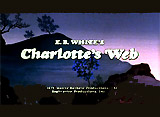
|
Charlotte's Web (1973)
- the moving death of spider
Charlotte (voice of Debbie Reynolds) on a wooden beam while singing
the last lines of "Mother
Earth and Father Time," after sacrificing herself for ill-fated
friend Wilbur the pig (voice of Henry Gibson) and producing her magnum
opus (an egg sac) -- and Wilbur's despairing cry of "CHARLOTTE!"
when he realized she was gone forever
|
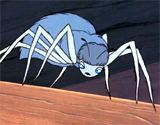

|
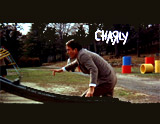
|
Charly (1968)
 #23 #23
- the sorrowful scene in which former 59-IQ Charly
Gordon (Cliff Robertson) found out that his newfound super-intelligence
was only temporary and then told former teacher and lover Alice
Kinnian (Claire Bloom) to leave him (after she had proposed marriage
to him)
- the tearjerking freeze-frame shot of Charly,
once again mentally retarded but smiling and care-free, playing
with other children on a see-saw
|

|
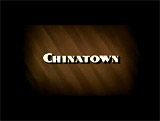
|
 Chinatown
(1974) Chinatown
(1974)
- the tragic ending scene in LA's Chinatown, when Evelyn
Mulwray (Faye Dunaway) fled in a convertible and was shot in the
back of the head - with the sense of loss and dread as the car slowed
to a stop in the far distance with its horn blaring as her blonde
daughter Katherine (Belinda Palmer) screamed, and the revelation
of Evelyn - shot through the head from behind as her face was horribly
blown apart through her flawed eye
- the haunting closing line
to a stunned and saddened private investigator Jake Gittes (Jack
Nicholson): ("Forget it, Jake, it's Chinatown")
|

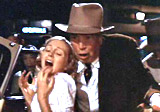

|

|
A Christmas Carol (1951, UK)
(aka Scrooge)
- the sad moment that Ebenezer Scrooge (Alastair Sim)
learned the fate of Bob Cratchit's (Mervyn Johns) son "Tiny"
Tim (Glyn Dearman) when he visited the future with The Spirit of
Christmas Yet To Come (C. Konarski) - and Tim's death was beautifully
signified by the shot of an empty stool with a small crutch leaning
against the wall next to it
- Scrooge's visitation to his own grave which he fell
upon, and then offering up a plea to the ghost: ("Tell me
l'm not already dead. Hear me, Spirit, l'm not the man l was. Believe
me, l'm not the man l was! Why
show me all this, if I am beyond all hope? Oh, pity me, Spirit,
pity me! And help me! Help me to sponge away the writing on the
stone if l repent. And l do repent, l do repent! l'll make good
the wrongs l've done my fellow man. And, l'll - l'll change! l'm
not the man l was. l'm not the man l was! Believe me. Believe me!
l'm not the man l was! Believe me! l'm not the man l was. l'm not
the man l was!")
- the
joyous redemptive ending in which a reformed Scrooge visited the
Cratchit family on Christmas morning, and was uncontrollably happy,
and the Narrator's summation of Scrooge's transformation, including
Tiny Tim's famous last line: ("Scrooge was better than his
word. He became as good a friend, as good a master, and as good
a man as the good old city ever knew, or any other good old city,
town, or borough in the good old world. And to Tiny Tim who lived
and got well again, he became a second father....And it was always
said that he knew how to keep Christmas well, if any man alive
possessed the knowledge. May that be truly said of us, and all
of us. And so, as Tiny Tim observed, 'God Bless Us - Everyone.'")
|



|

|
The
Chronicles of Narnia: The Lion, the Witch and the Wardrobe (2005)
- the scene of the cruel sacrifice of the majestic,
Messianic lion Aslan (voice of Liam Neeson) at the Great Stone
Table. Aslan proceeded alone to the altar, through a gauntlet of
the White Witch's (Tilda Swinton) hideous and evil followers. After
the "great
lion" was humiliated and laughed at - without fighting back,
he was bound up and his glorious mane was shaved. Aslan was then
dragged to the altar where the White Witch told him: ("Did you
honestly think by all this that you could save the human traitor?
You are giving me your life and saving no one. So much for love") She
stood and announced to the cheering, frenzied crowd: ("Tonight,
the Deep Magic will be appeased. But tomorrow, we will take Narnia
forever! In that knowledge, despair and die!") She then plunged
her dagger into Aslan's side to kill the "Great Cat."
- having
witnessed the death, Lucy (Georgie Henley) and Susan Pevensie (Anna
Popplewell) afterwards went up to the altar to grieve over Aslan's
corpse
|



|










































